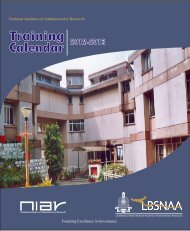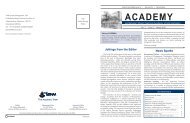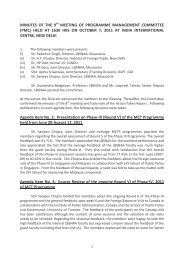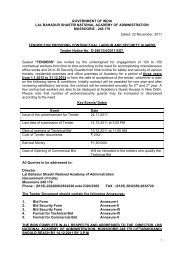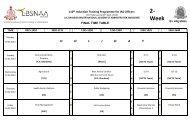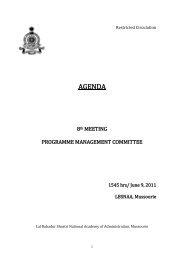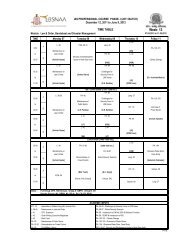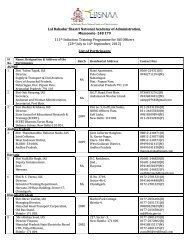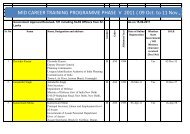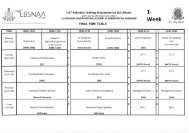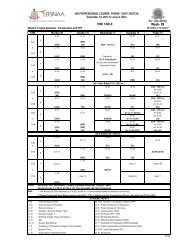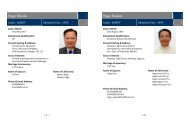Create successful ePaper yourself
Turn your PDF publications into a flip-book with our unique Google optimized e-Paper software.
� Winter Study Tour (eight weeks – commencing on 17th December 2011 to 10th February 2012)<br />
� On-campus training inputs commencing on 21st February 2012 till 8th June 2012, along with week-long<br />
attachment with the Bureau of Parliamentary Studies and Training in New Delhi in April 2012<br />
The Phase I Programme: A Typical Day<br />
The Phase I is a full time training programme with an eclectic mix of curricular and extra-curricular activities. A typical<br />
day would commence at 0630 hours with physical exercises at the Polo ground. Academic sessions would<br />
commence at 0930 hours sharp. The details would be specified in the weekly timetable. Unless altered otherwise<br />
through special notices, there would be following 55-minute sessions during a working day.<br />
Sessions Timings<br />
Session I - 0930-1025 hrs<br />
Session II - 1035-1130 hrs<br />
Tea break<br />
Session III - 1200-1255 hrs<br />
Session IV - 1305-1400 hrs<br />
Lunch break<br />
Session V - 1500-1555 hrs<br />
Session VI - 1630 - 1730 hrs<br />
(Session VI would usually be stipulated for games/ extra-curricular activities)<br />
The evenings would be dedicated to programmes by Clubs and Societies including cultural programmes.<br />
Attendance in all the sessions listed in the weekly timetable is compulsory.<br />
Academic Inputs<br />
The on-campus academic training commences on 21st February 2012. While the syllabus prescribed under "The<br />
Indian Administrative Service (Officer Trainees' Final Examination) Regulations, 1955" is the basic framework, suitable<br />
modifications have been made to adapt it to the changing training needs of IAS Officers. The academic modules are<br />
structured around thematic inputs covering varied domains that IAS Officers have to deal with. These would be<br />
interspersed among sessions in Law, Economics, Political Theory and Constitution, Languages and ICT.<br />
The training methodology being adopted in this <strong>Course</strong> would constitute a mix of lectures, case discussions,<br />
seminars, panel discussions, order writing exercises, moot courts and mock trials, management games and role<br />
plays, group exercises, films and slide shows, field and outdoor visits, among others. Several experts and eminent<br />
persons from diverse backgrounds would be invited to address you during the <strong>Course</strong>. These would expose you to<br />
alternative perspectives and diversity of opinion, which are necessary for making any considered decision.<br />
As an IAS Officer, you have to become thorough with the language of the State of allotment. Statutory language<br />
examinations would be held during the Phase I programme. Those of you already familiar with the cadre language will<br />
be provided advanced instruction in administrative usage of the language and will also be required to undertake<br />
alternative modules and activities. You would be required to present your State Paper in the cadre language, while the<br />
hard copy of this assignment can be submitted in English. The ICT module for Phase-I has been designed specifically<br />
to familiarize you with computing environment in districts, concepts/issues involved in computerizing a system, latest<br />
trends in technology, web design, client/server computing, e-governance and so on. The idea behind this input is not<br />
to make Officer Trainees “computer-professionals”, but to acquaint them with the capabilities of technology in their<br />
real life working environments.<br />
08<br />
09



